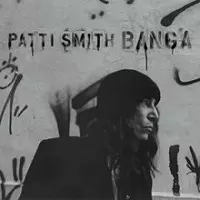While Banga is her first studio album in five years (eight if you don't count the covers collection Twelve), Patti Smith hasn't exactly been on vacation. She's been off curating art shows and acting on Law & Order: Criminal Intent. She's also put out some of the best work of her career, in the form of The Coral Sea, a spoken word piece with My Bloody Valentine's Kevin Shields, and the memoir Just Kids. Both dealt with her complicated relationship with the artist Robert Mapplethorpe, and both were guttingly revelatory. Coupled with her "classic" records, like Horses and Easter, Smith has built an interesting, multi-medium legacy.
Which is why Banga is kind of disappointing.
It's actually a good record. Not great, but it packs some killer cuts that should go over well live next to "the hits." It starts and ends well, trading Smith's trademark punk anger for a more psychedelic vibe, and even features Johnny Depp on guitar, which is kind of neat. At its best, Banga makes good on that rock ân' roll reverence/anarchism Smith has always held ("I don't fuck much with the past / But I fuck plenty with the future"). At its worst, well, Banga comes off like the Doors at their most directionless.
Oh, but those good parts are so dang good. "Amerigo" opens the record with Smith in poet mode. And I'll tell ya, few people make every line hit like Smith does. The way the song shifts into a delicate chorus of "Where are you going?" and then back to its spoken verses is jarring, but fitting. "April Fool" treads towards cliché lyrically, but it's respectable. "Fuji-san" is a prayer for protection, and a powerful one.
But gradually, the record sinks into midtempo pysch nothingness. While it offers glimmers of life, like on the punk rock title track, the record's back half probably could have shaved off two tracks and been all the stronger for it. Considering that Smith has been working on this album on and off since 2008, though, that's a little disappointing.
But while the middle is middling, Banga acquits itself with "Constantine's Dream." At 10-and-a-half minutes, it's twice as long as anything else on the record, and it is going to rule so hard live when Smith jams it out. Here, she reverts back to her rock ân' roll shaman persona. Lenny Kaye builds his guitar squalls to a terrible climax while Smith improvises imagery about St. Francis and prayer. It's a powerful song, and an amazing way to close out and redeem the record.
â¦or it would be, were it not for the actual final track, a cover of Neil Young's "After the Gold Rush." If you want a summary of how well Banga works as an album, there is no better juxtaposition than having its best and worst tracks side by side. Musically "Gold Rush" is simply but tastefully arranged with piano and acoustic guitar. I could see it being intended as a palette cleanser after the epic, twisting "Constantine's Dream," but that song has such a strong sense of finality that the idea of anything coming after it just feels unnecessary. That such an unnecessary track would in turn be a cover no one needed, backed by a got-damn children's choir to hammer home the lines "Look at mother nature on the run in the 21st century," is just too much.
Still, while Banga is a mixed bag, it boasts enough strong tracks to justify a tour. It brings Smith back to guitar-based rock, her forte. In the digital era, with a little editing, fans can make their own superior cut of the record and be happy.
